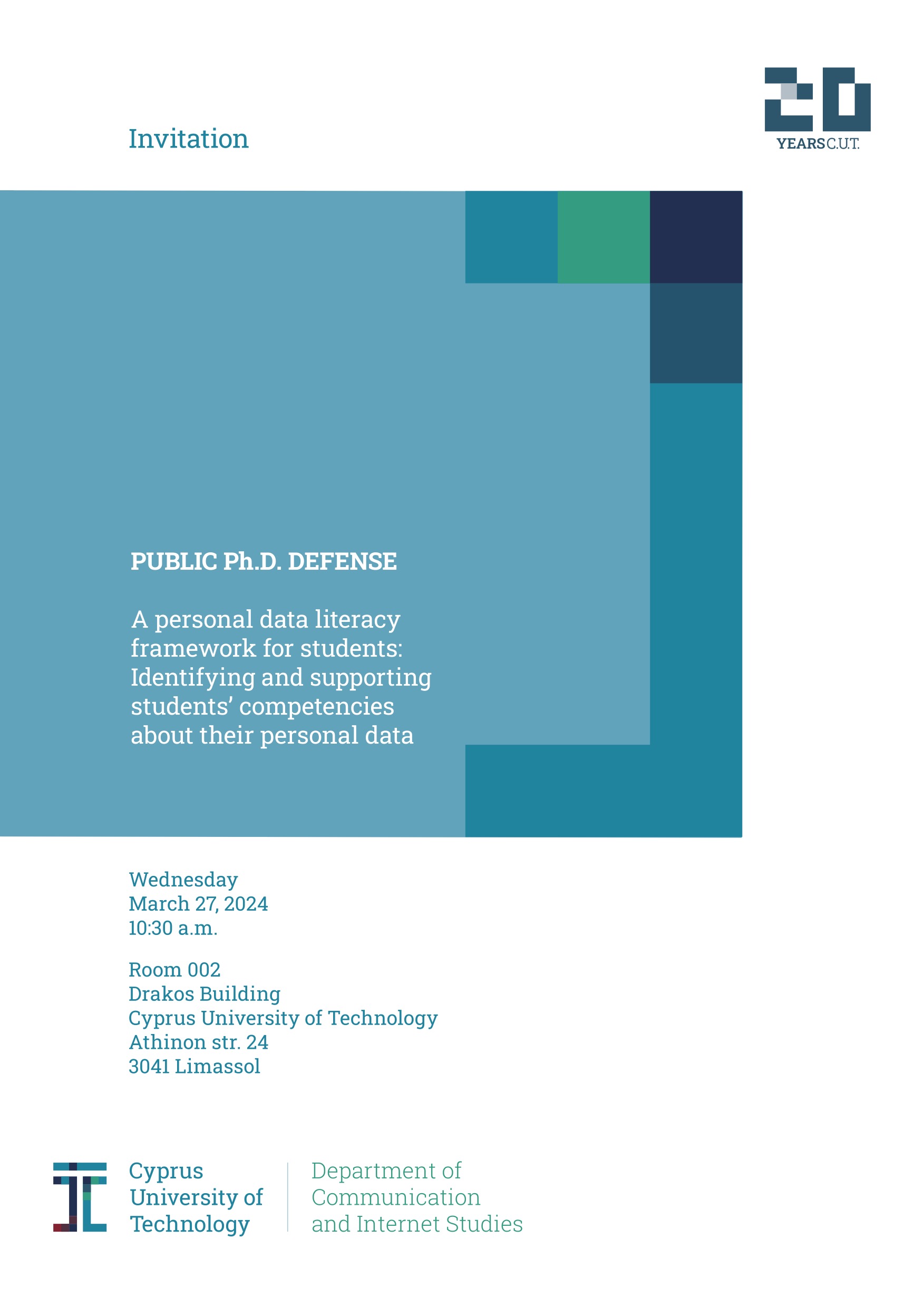You are invited to the Ph.D. defense of Andria Agesilaou
Α personal data literacy framework for students: Identifying and supporting students’ competencies about their personal data
Wednesday, March 27, 2024, at 10:30 a.m.
Drakos building, Room 002
Supervisor
Eleni A. Kyza, Professor, Cyprus University of Technology
Members of the Examining Committee
Victor R. Lee, Associate Professor, Stanford University, USA (Chair)
Stavroula Kontovourki, Associate Professor, University of Cyprus
Short bio
Andria Agesilaou has a Master’s degree in “New Technologies for Communication and Learning” from the Department of Communication and Internet Studies of the Cyprus University of Technology, and a BA in Primary Education from the National and Kapodistrian University of Athens, Greece. She is currently employed as a Research Associate at the Department of Communication and Internet Studies of the Cyprus University of Technology. Her research interests focus on the design and implementation of innovative learning environments grounded on cutting-edge technologies in formal and informal STEAM education, through design-based research. In particular, her research focuses on the design and development of innovative technology-enhanced learning environments for students, while offering professional development opportunities for teachers in understanding and implementing literacy efforts aiming to strengthen students’ personal data privacy and security.
Abstract
To increase children’s agency in the data economy, efforts should be made to empower them by helping them become personal data literate. Personal data literacy involves a spectrum of technical, conceptual, and critical competencies necessary for children to recognize, reflect, and respond to the socio-economic practices of Big Data. Research has shown that children and adolescents have difficulties in recognizing and understanding how, when, and by whom their personal data are being collected, processed, and reused, while many reports confirm violation of children’s data rights. Existing frameworks on the matter have focused either on adults, or do not explicitly discuss how such kinds of literacy can be conceptualized for children, what kind of competencies children, as a special population, might need to develop, and what kind of literacy interventions might work best. This presentation will explain the research efforts to develop a competency framework for identifying and supporting students’ competencies about their personal digital data.
Τhis doctoral work investigated the following overarching research question: How can the design of educational interventions, aiming to foster students’ personal data literacy, be supported? Following a design-based research approach, and employing qualitative methods, this doctoral research collected data from three elementary schools, six classrooms, and a total of 103 students. I will first report on the design of a learning environment to enable upper elementary school students to produce their own personal data using activity trackers and reflect on them. I will then present data from the implementation of this learning environment in three elementary school classes in Cyprus, with 63 students. The results informed the development of the PeDaL framework, a pedagogical tool demonstrating a taxonomy of competences to support the development of students’ personal data literacy. Finally, I will discuss how these findings informed the redesign of the learning environment, based on the PeDaL framework.
The findings of this doctoral research can contribute to advancing understanding on how personal data literacy can be defined and framed for students, by demonstrating the spectrum of competencies students should have. The design and implementation of the learning environment resulted in a better understanding of upper elementary school students’ data disclosure practices, supporting the identification of conceptual gaps, and of the types of pedagogical activities that students might need to develop personal data literacy competencies.
I will conclude my presentation by discussing the main limitations of this doctoral research and avenues for further research.



